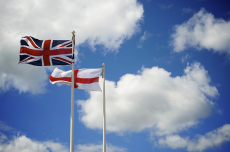
However, revisionists say that just because the working classes would listen to the songs it doesn’t correlate that they agreed with the views stated. It was merely a form of entertainment. This is subject to discussion because working class Britons were becoming more aware of the world around them as literacy rates were increasing, meaning that they could read the ever growing newspapers and were politically motivated because by 1884 two thirds of working class men could vote. This casts a shadow on the revisionist viewpoint because it strongly suggests that working class men would have cared about the highly political songs being sung in music hall.
The middle and upper classes were mostly pro-empire. This attitude was encouraged in elementary schools through studying Imperial Britain and even more so in public schools by being trained as leaders of men and playing highly competitive sports to build teamwork. Muscular Christianity was another ideology used by the Church to indoctrinate the students meaning it was inevitable for the majority of young men to have an Imperialist attitude. By doing this the government were trying to ensure that the new generation of Britain would be one of strong pro-empire opinions to secure Britain’s empire for the future.
Middle class citizens would have been interested in Britain’s empire because of the jobs that they held. A banker would have wanted the economy to be stable so that their customer bases could increase and without the empire the economy wouldn’t thrive because there would be less trade and less land from which industrial companies, many of which had been founded by middle class citizens who also reeked the benefits from empire, could use to gain raw materials and make money. Small business owners would be pro-empire for the same reasons because a good economy means that people would have more wealth to spend. The upper class would have motive to be pro-empire as well because many were landowners and with a growing empire comes more area on which to make money out of. These financial incentives were reasons for why empire was generally popular in the minds of upper and middle class Britons throughout the period of 1880 to 1902.
To conclude, to a large extent the policy of imperialism was popular. The music hall of the working class and the financial incentives of the middle and upper classes as well as the route education took all meant the attitudes of all classes were positive towards the idea of Britain as a worldwide empire. Events such as the celebrations of Mafeking in May 1900 support this and the fact that the Conservatives, known for their strong imperial policy, won in the Khaki elections in the heat of the Boer War in September 1900 certainly shows that the majority of voters supported this cause. More negative events from 1880-1902 may have swayed public opinion temporarily such as the hysteria with General Gordon’s death. However these were temporary lapses in confidence of imperial policy because without public support, which was becoming increasingly more necessary for the government to take certain actions due to increasing numbers of voters and the popular press revolution, the government would not have felt strong enough to actively expand and retain the British Empire.
Image: By THOR (Summer Sky in Southsea England) [CC BY 2.0 (http://creativecommons.org/licenses/by/2.0)], via Wikimedia Commons

0 Comment:
Be the first one to comment on this article.